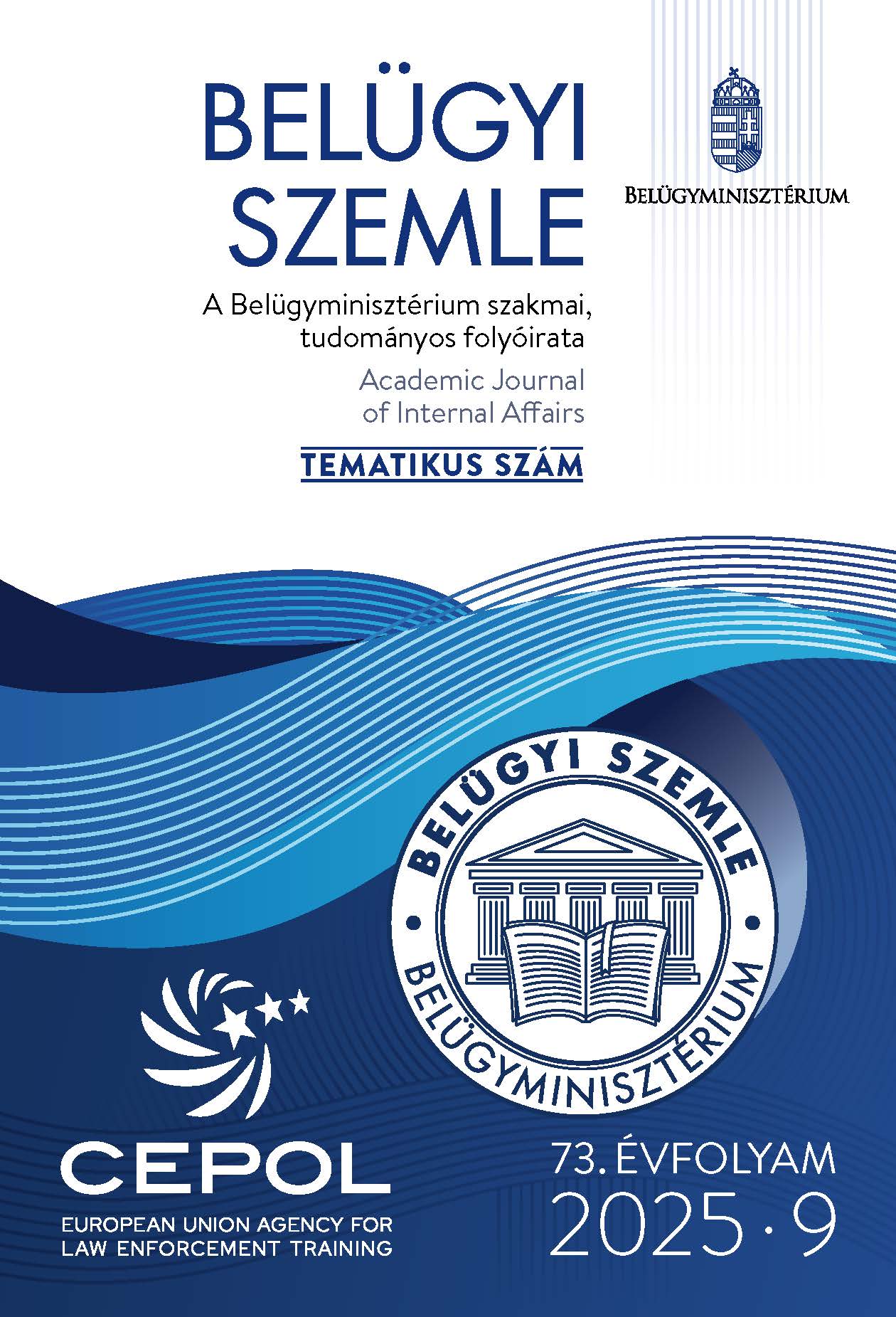Absztrakt
Cél: A cikk a tudományos kutatás és innováció központi szerepét vizsgálja a bűnüldözési képzés fejlesztésében, hangsúlyozva az empirikus eredményeket, mint a hatékony bűnmegelőzés és a demokratikus elszámoltathatóság alapját.
Módszertan: Összefoglalja a tudomány bűnüldözési kultúrába való integrálásának kereteit, kiemelve a proaktív, helyhez kötött és célzott beavatkozások kiemelkedő előnyeit a hagyományos reaktív megközelítésekkel. A cikk a kutatások szisztematikus integrálását szorgalmazza a bűnüldözéssel kapcsolatos oktatás, az intézményi reformok és a vezetőképzés területén. Mindezt az operatív eredmények javítása, a folyamatos tanulás elősegítése és a nemzetközi átjárhatóság előmozdítása érdekében.
Megállapítások: A cikkben bemutatásra kerül, hogy a CEPOL kutatásai hogyan erősítik – a képzési kínálat javítása érdekében történő beavatkozásokkal – az ügynökség fő tevékenységének, a bűnüldözési képzésnek a minőségét. Az írás kiemeli a szakirodalom áttekintéséből származó számos eredmény gyakorlati alkalmazását azáltal, hogy röviden bemutatja a portfóliójában szereplő kutatási tevékenységeket, így demonstrálva, hogy az elméleti ismeretek hogyan integrálódnak aktívan a valós kutatási tevékenységekbe.
Érték: A cikk hangsúlyozza a tényeken alapuló képzési reform globális jelentőségét, különösen az európai bűnüldözés kontextusában, és érvel a képzési paradigmák stratégiai átszervezése mellett a kortárs biztonsági és legitimitási kihívások kielégítése érdekében. Mindez a CEPOL által már biztosított kiválósági képzés eredménye.
Hivatkozások
Andersen, J. P., Papazoglou, K., Nyman, M., Koskelainen, M., & Gustafsberg, H. (2016). Fostering resilience among police. Journal of Law Enforcement, 5(1), 1–13. https://doi.org/10.1177/2158244015590446
Boulton, L., Bennett, A., & Williams, N. (2020). Knowledge mobilization in policing: The importance of evidence-based training. Policing: A Journal of Policy and Practice, 14(4), 867–880.
Brook, O., & K. J. Cseres, (2024). Priority Setting as the Blind Spot of Administrative Law Enforcement: A Theoretical, Conceptual, and Empirical Study of Competition Authorities in Europe. Modern Law Review, 87(5), 1209–1257. https://doi.org/10.1111/1468-2230.12881
Brown, K. C., Garlappi, L., & Tiu, C. (2020). The impact of conferences on portfolio management: Evidence from mutual funds. Journal of Financial Economics, 136(2), 456-478.
Casey, W. M. (2025). Translational Criminology and Law Enforcement. American Journal of Criminal Justice, 50, 94–118. https://doi.org/10.1007/s12103-024-09779-3
Faff, R. W. (2015). A blueprint for publishing in finance research journals. Pacific-Basin Finance Journal, 35(A), 1-9. https://doi.org/10.1016/j.pacfin.2015.07.002
Fijnaut, C. (2004). The 2004 CEPOL European Police Research and Science Conference Prague. Czech Republic on 9-12 November 2004.
Fyfe, N., Terpstra, J., & Tops, P. (2013). Centralizing forces? Comparative perspectives on contemporary police reform in northern and western Europe. Eleven International Publishing.
Johnson, B. T., & Huedo-Medina, T. B. (2019). Networking and conferences in the scientific community. Journal of Research Practice, 15(1), Article V1.
Loftus, B. (2009). Police culture in a changing world. Oxford University Press.
Lum, C., & Koper, C. S. (2017). Evidence-Based Policing: Translating Research into Practice. Oxford University Press.
Lum, C., Koper, C. S., & Telep, C. W. (2011). The Evidence-Based Policing Matrix. Journal of Experimental Criminology, 7, 3–26. https://doi.org/10.1007/s11292-010-9108-2
Milojević, S., Milojković, B., & Janković, B. (2025). The Effectiveness of Police Forces Through Centuries: The Evolution of Training Process in Contemporary Social Context. NBP. Nauka, bezbednost, policija, 30(2), 127-147). https://doi.org/10.5937/nabepo30-50861
Oliver, B. (2019). Making micro-credentials work for learners, employers and providers. Deakin University.
Paoline, E. A., III. (2003). Taking stock: Toward a richer understanding of police culture. Journal of Criminal Justice, 31(3), 199-214.
https://doi.org/10.1016/S0047-2352(03)00002-3
Seitakova, B., Saitbekov, A., & Kulmukhanbetova, B. (2024). Social Determinants of Police Efficiency in Kazakhstan: A Criminological Perspective. Pakistan Journal of Criminology, 16(3), 369-384. https://doi.org/10.62271/pjc.16.3.369.384
Sherman, L. W. (2013). The rise of evidence-based policing: Targeting, testing, and tracking. Crime and Justice, 42(1), 377-451. https://doi.org/10.1086/670819
Sherman, L. W. (1998). Ideas in American policing: Evidence-based policing. Police Foundation. https://www.policinginstitute.org/wp-content/uploads/2015/06/Sherman-1998-Evidence-Based-Policing.pdf
Smith, M. R., & Alpert, G. P., & Fridell, L. A. (2016). Promoting effective homicide investigations: A national report. Police Quarterly, 19(2), 118-145.
Smith, M. R., & Alpert, G. P. (2007). Improving police officer training in the United States. Police Practice and Research, 8(1), 1-15.
Todorov, V., & Bollerslev, T. (2010). Jumps and betas: A new framework for disentangling and estimating systematic risks. Journal of Econometrics, 157(2), 220-235. https://doi.org/10.1016/j.jeconom.2009.11.010
Unlu, A., Viskari, I., Rönkä, S., & Tammi, T. (2025). Developing Strategic Foresight for Drug Policy: Trends, Scenarios, and Implications. Drugs: Education. Prevention, and Policy, 32(3), 227-242. https://doi.org/10.1080/09687637.2024.2331574
Walker, S. (2005). The new world of police accountability. SAGE Publications. https://doi.org/10.4135/9781452204352
Weisburd, D., & Neyroud, P. (2011). Police Science: Toward a New Paradigm. New Perspectives in Policing Bulletin. Harvard Kennedy School. U.S. Department of Justice, National Institute of Justice.

This work is licensed under a Creative Commons Attribution-NonCommercial-NoDerivatives 4.0 International License.
Copyright (c) 2025 Belügyi Szemle

